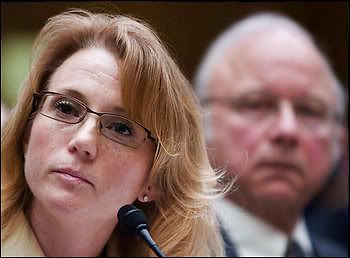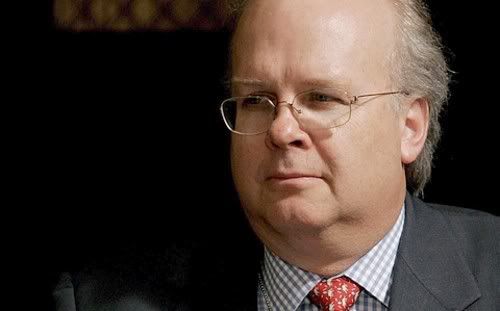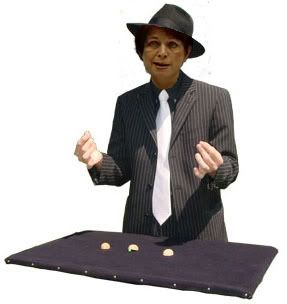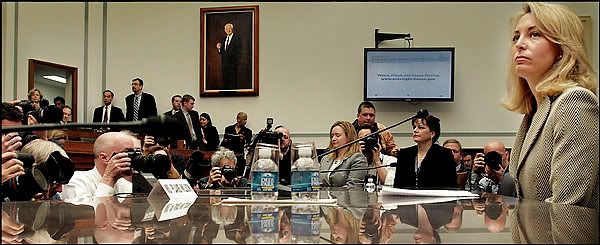 Theresa Payton, White House Office of Administration chief information officer, and Allen Weinstein, United States archivist, testify on Capitol Hill. (By Manuel Balce Ceneta -- Associated Press)
Theresa Payton, White House Office of Administration chief information officer, and Allen Weinstein, United States archivist, testify on Capitol Hill. (By Manuel Balce Ceneta -- Associated Press)The Washington Post reports:
After promising last year to search its computers for tens of thousands of e-mails sent by White House officials, the Republican National Committee has informed a House committee that it no longer plans to retrieve the communications by restoring computer backup tapes, the panel's chairman said yesterday.
The move increases the likelihood that an untold number of RNC e-mails dealing with official White House business during the first term of the Bush administration -- including many sent or received by former presidential adviser Karl Rove -- will never be recovered, said House Democrats and public records advocates.
The RNC had previously told the House Oversight and Government Reform Committee that it was attempting to restore e-mails from 2001 to 2003, when the RNC had a policy of purging all e-mails, including those to and from White House officials, after 30 days. But Chairman Henry A. Waxman (D-Calif.) disclosed during a hearing yesterday that the RNC has now said it "has no intention of trying to restore the missing White House e-mails."So what is Henry Waxman going to do?
"The result is a potentially enormous gap in the historical record," Waxman said, including the buildup to the Iraq war.
Spokesman Danny Diaz said in a statement that the RNC "is fully compliant with the spirit and letter of the law." He declined further comment.
Administration officials have acknowledged that Rove and many other White House officials routinely used RNC accounts for government business, despite rules requiring that they conduct such business through official communications channels. The RNC deleted all e-mails until 2004, when it exempted White House officials from its e-mail purging policy.
About 80 White House aides used RNC accounts for official government business, committee staff members said. Rove, for example, sent or received 140,000 e-mails on RNC servers from 2002 to 2007, and more than half involved official ".gov" accounts, the panel has said.
The RNC dispute is part of a broader debate over whether the Bush administration has complied with long-standing statutory requirements to preserve official White House records -- including those reflecting potentially sensitive policy discussions -- for history and in case of future legal demands.
The committee is investigating allegations that vast stores of official Bush administration e-mails have also gone missing from the White House, which scrapped a Clinton-era archiving system and has struggled with data retention problems.
A former White House technology manager told the committee in statements released yesterday that the Bush administration's e-mail system "was primitive and the risk that data would be lost was high."
Steven McDevitt, who left the White House in 2006, said he supervised an internal study that found hundreds of days in which no electronic messages were stored for one or more White House offices from January 2003 to August 2005. The study stated a range when tallying the total number of days in which an office had no recorded e-mails, from 473 -- which had been previously reported -- to more than 1,000, McDevitt said.
McDevitt also said security was so lax that e-mail could be modified by anyone on the computer network until the middle of 2005.
Administration officials defended their efforts to fix the problems, and said they are still working to locate and identify e-mails reported as missing. "We are very energized about getting to the bottom of this," said Theresa Payton, chief information officer at the Office of Administration.
At the hearing, Payton and GOP lawmakers attacked the 2005 White House study overseen by McDevitt, calling it flawed and unreliable. McDevitt said the 250-page study involved numerous senior technology officials as well as outside contractors.
Rep. Thomas M. Davis III (Va.), the committee's ranking Republican, said in a statement that the missing e-mail allegations are "based on a discredited internal report conveniently leaked to the media." He also said that yesterday's hearing was "less about preserving records and more about resurrecting the spurious claim that the White House 'lost millions of official e-mails.'"
Davis also said, based on a briefing by Payton, that the actual number of days with missing e-mails was 202. "A substantial portion of the so-called 'missing' e-mails appear not to be missing at all, just filed in the wrong digital drawer," Davis said. No other committee member followed up on that allegation during the hearing.
It's not as if Congress wasn't forewarned about Bush's choice of archivists or Bush's assaults on the public's right to know and access to his administrations' documents, both in Washington and Texas.
According to News.com, recovery may be an issue of money and moving obstructionist Republicans on the committee (like Davis and Darrel Issa) out of the way.





